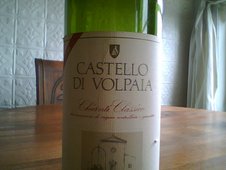Now, I have the same problems with kosher wine that most wine lovers have, particularly when the lucious juice is willfully boiled. But I've drunk enough kosher vino over the years to recognize that Prime Grill had probably the best little cellar possible under the circumstances. Plus, the list contained two bottles from Chateau Valandraud, the famed garagiste Bordeaux, and, for my money, the best kosher wine on the planet.
Here is the link to the full article. The text follows.
On the face of it, the wine cellar run by sommelier Rick Bruner doesn't look measurably different than those at other Manhattan restaurants. It's a bit smaller, perhaps, less grand. Still, it's a sterile room full of bottles like many others. But this collection is different, for every chilled vessel on display once felt the brief kiss of red-hot flame.
Mr. Bruner, you see, works at Prime Grill, about as high a high-end kosher restaurant as you're likely to find in New York City. Every vintage on the 50-count wine list is not only kosher — that is, made by observant Jews and according to Jewish dietary law — but also mevushal, meaning the wine is boiled.
"As part of our kosher certification, and as an effort to make it easier on the guests, all the wines are mevushal," Mr. Bruner said. "That way, they don't have to worry." What's to worry about? Well, who handles the wine, for one. Only a kosher wine designated mevushal can be opened, toted, and poured by any pair of hands, be they Jewish or not. The stricture goes back to ancient times, when pagan faiths used wine for idolatrous ceremonies. It was then thought that, if the wine was pasteurized, it would be unfit for pagan worship, and thus safe for Jews. Though pagans are harder to find these days, the stipulation is still upheld, particularly in Orthodox circles. And for Prime Grill, a mevushal lineup is an imperative, since few of the waiters are Jewish.
The process that makes a wine mevushal is not as brutal as one might think. Nothing is boiled in a pot. The method used nowadays is known as flash pasteurization, and is akin to flash-frying a fish. "The wine is laid out to a few millimeters thick," Mr. Bruner explained, "and flash boiled and then cooled down, in an effort to maintain some of the complexity, some of the body. Because when you do boil it, as a matter of fact, you are breaking down the wine. That's why your zinfandels and cabernets will hold up much better. The pinot noirs and Rhone wines are a little harder."
The thought of wine being boiled — even momentarily — can make a wine purist fall into a dead faint. Some kosher winemakers aren't so crazy about it, either. Mr. Bruner, in an effort to increase the breadth and quality of his list, spends some of his time trying to coax vintners into making a mevushal product. Prime Grill — like Solo, its sister restaurant nearby in Midtown — has a number of exclusive mevushal selections on offer, and the wine director wants to see more.
"We're trying to grow our Israeli list right now," he said. "There are a lot of high-end Israeli wines that refuse to do mevushal." One of those list exclusives is the top-priced wine on the list, a 2002 Grand Cru Bordeaux from St. Emilion's tiny, but highly rated Chateau De Valandraud. It goes for $760. It also bears an OU certification, as must all of Prime Grill's wines. "That's another thing that defines our boundaries," he said.
Mr. Bruner, 30, had to take a crash course in kashrut and hechshers when he joined Prime Grill four and a half years ago. At the time, he wasn't familiar with even the most established kosher names such as Baron Herzog and Abarbanel. These days, part of his job is to make his clientele comfortable with the labels on the list that go beyond Herzog and Abarbanel. "A lot of families are more apprehensive about trying the Italians or French wines," he said. "They don't recognize the names."
Mr. Bruner is also in charge of the liquor supply and here, again, his job can be a challenge. Most spirits, being made of grains, are automatically kosher, but there are exceptions. "With your single malts, it cannot be aged in Madeira or Sherry casks, because that's wine," he said. "Those casks aren't kosher. And the only flavored vodkas we can carry are Stolichnaya, because they're the only ones who have an OU certification."
When he can't find something he wants among the available kosher intoxicants, he tries to make it himself. "I went to a food show a couple months ago and they had a green tea liqueur," he said. "But the tea leaves to make their liqueur were not inspected by a rabbi, so they're not kosher. So I said, ‘OK, I'll try to make my own.'" He took a bottle of Prime Grill's house vodka, Zenkoff, put in a couple cups of sugar, some food coloring, and tea leaves and let it sit for a month.
There were no lightning storms over Prime Grill when Mr. Bruner went in for this bit of mad-scientist experimentation. Nonetheless, the waitstaff has since nicknamed him Dr. Zenkoff.


No comments:
Post a Comment